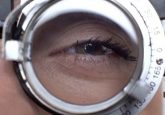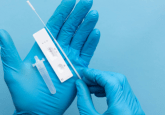DNA stranded in the gel

The clever use of a specially modified primer during PCR allows the rapid and inexpensive gel electrophoresis-based purification of single-stranded DNAs.

Single-stranded DNA (ssDNA) molecules, which are used for hybridization probes, aptamers, and DNA nanotechnology, are easily and reliably obtained by purification from PCR products. While there are several methods for ssDNA isolation from PCR amplicons, they vary greatly in terms of cost, ease-of-use, and the degree of contamination with double-stranded DNA (dsDNA).
In this issue of BioTechniques, Peter Allen at the University of Idaho describes a simple and inexpensive gel electrophoresis-based purification method that produces very pure ssDNA. A commercially available primer modified at its 5’-end with an acrydite group is used to generate the unwanted complementary strand of the desired ssDNA during the PCR reaction. When the PCR product is denatured and mixed with polymerizing acrylamide and then added to the well of a denaturing polyacrylamide gel, the acrydite group becomes incorporated into the polyacrylamide, immobilizing the complementary ssDNA strand within the well. This allows the desired ssDNA strand to be electrophoresed out of the well into the gel and then easily purified by size separation.





